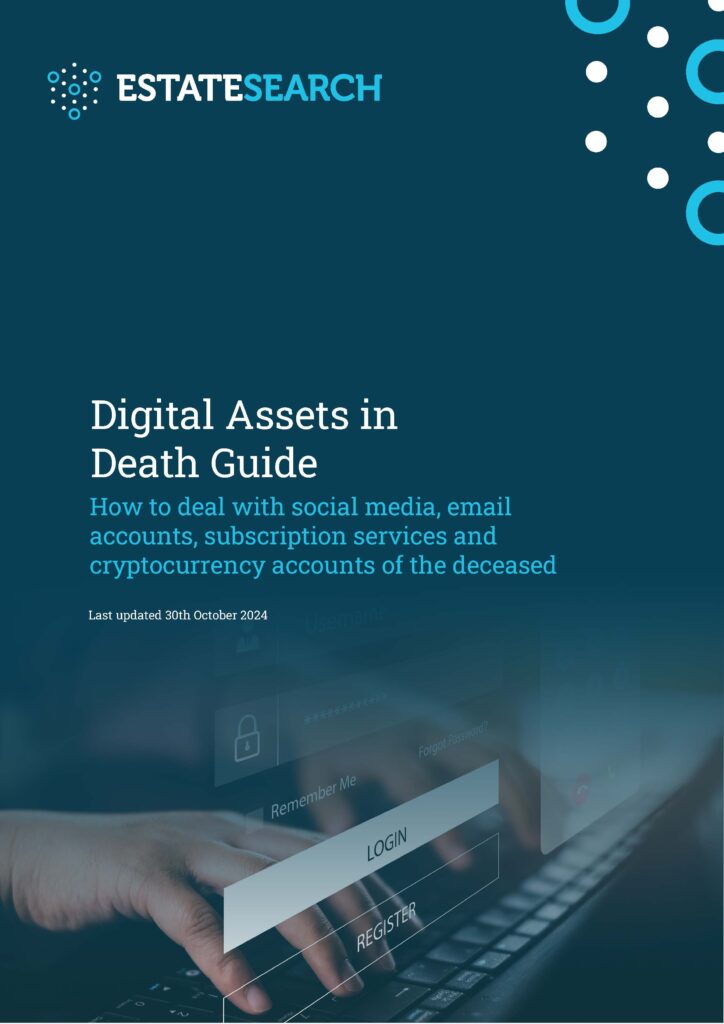Digital Assets can be defined as “anything that someone owns that exists in a digital format.” Such assets are wide ranging and can be sentimental such as photographs in a Facebook account or documents. They may also include assets or liabilities with monetary value such cryptocurrency wallets or PayPal accounts, or subscriptions which would be considered a debt and need to be cancelled to ensure that payments aren’t carried forward post death.
According to research by RBC:
- On a per capita basis, Canadians spend the most time online of any country in the world, each logging an average of 43.5 hours per month.
- Nearly all Canadians under the age of 45 use the internet every day.
- Among seniors (between the ages of 65 and 74), internet use sits at over 80 percent.
You can find the research here.
Digital Assets in Estate Administration – The Challenge
As a result, the need to identify and deal with Digital Assets in estate administration is increasingly common as technology continues to expand into our modern lives, and at Estatesearch we support law firms in this area.
In 2024, Estatesearch commissioned a consumer research study of 2,000 Canadians and we found that 34% of respondents own digital assets including 17% with online gaming/gambling accounts and 16% cryptocurrency. Yet, 51% had not considered or didn’t know if they had considered digital assets when it came to estate planning.
And, it’s not just the younger generations that have moved online. We found that in the over 65 age group, 11% have digital assets. The fact is that digital assets are a rapidly evolving area, and the challenges of identification are only set to increase in the future as our society’s reliance on online interactions grows.
One of the main issues is that some of these digitally held assets could be of significant value. According to https://www.moonpay.com/en-gb/learn/web3/canada-cryptocurrency-statistics Canada’s cryptocurrency market revenue is forecast to reach $1.7 billion in 2024, and projections suggest it will grow at an annual rate of 8.37%, hitting $2.4 billion by 2028.
Currently, digital is a largely unregulated space, but lawyers still need to ensure due diligence obligations have been met by undertaking enquiries to demonstrate that they have done everything possible to identity the full extent of the estate on behalf of their clients.
While there is no specific Canadian legislation addressing digital asset succession, several existing laws, including those set out below, may be relevant.
Succession Law Reform Act
The Succession Law Reform Act governs the distribution of estates in Ontario and it outlines rules for the appointment of executors, the administration of estates, and the distribution of assets. Executors must consider the provisions of this Act when dealing with assets including digital assets, to ensure that the wishes of the deceased are adhered to, and assets are distributed according to law.
Personal Property Security Act
The Personal Property Security Act governs the creation, registration, and enforcement of security interests in personal property. For digital assets that are considered personal property, it may be relevant. For example: The Personal Property Security Act would apply to determine the lender’s rights and the deceased person’s estate for a loan secured using digital assets as collateral.
Privacy Legislation
Several federal and provincial laws govern the collection, use, and disclosure of personal information, including Canada’s Personal Information Protection and Electronic Documents Act (PIPEDA) and Ontario’s Freedom of Information and Protection of Privacy Act (FIPPA). This regulation may be applicable in relation to accessing and managing digital assets containing personal information. Privacy laws must be complied with when executors access or managed digital assets, such as social media or email accounts.
Copyright Act
The Copyright Act governs the creation, ownership, and use of copyrighted works. Executors must consider this when dealing with digital assets protected by copyright for example: digital assets such as photos, videos, and music files which may be protected.
Canadian Case Law and Digital Assets
While no specific Canadian legislation directly addresses the succession of digital assets, courts have gradually adapted existing legal principles to handle digital asset issues. The evolving case law suggests that courts are more inclined to treat digital assets as personal property, which can be dealt with in the same way as physical assets under the laws of inheritance.
One significant issue that courts have explored is the transferability of digital assets through a Will or intestacy. For instance, in cases where individuals have digital assets stored in online accounts or in the form of cryptocurrencies, courts have generally upheld the idea that these assets can be inherited by heirs, similar to traditional assets.
However, the ownership of digital assets can get complicated, especially in cases involving shared accounts or assets created during a relationship. For example, a digital asset created or shared by spouses or partners might require careful analysis to determine whether it belongs solely to one party or jointly. Digital assets often come with terms of service agreements (for example, for social media platforms or cloud services), which could restrict or complicate the transfer of ownership or access upon an individual’s death. Courts have sometimes addressed these complications by considering the intent of the deceased, as well as the terms of the digital platforms involved.
Overall, the case law on digital assets in Canada is still developing, and it remains important for individuals to plan ahead for the management and transfer of their digital assets through proper estate planning, such as by creating a digital will or designating digital executors. We predict that identifying Digital Assets in estate administration will only become more challenging from here.
Estatesearch’s new Digital Assets Bolt-on Search covers: Cryptocurrency exchanges including Bitcoin, Ethereum, online gambling and betting service providers; Digital Banks, online payment services and investment platforms, making enquiries of 55 digital providers to help identify profiles belonging to deceased individuals.

Our Digital Assets in Death Guide
To support lawyers in this complex and rapidly changing area, Estatesearch has developed a free Digital Assets in Death Guide which looks at how to deal with the social media, email accounts and subscription services of the deceased.
This free guide outlines the steps that can be taken to ensure Digital Assets are dealt with properly.
Request your free copy below.
Find out how to extend your Financial Profile Search to include Digital Assets.


